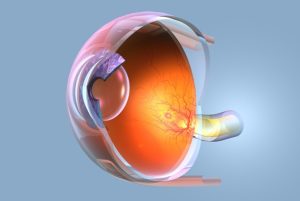Macular Degeneration (AMD) Treatment in Baltimore
 The macula is a small section in the center of the light-sensitive tissue at the back of the eye called the retina. This tiny but essential part of your eye gives you the ability to see objects in front of you clearly, such as faces and written words. Many eye problems and diseases can affect the macula, leading to vision loss without treatment. Our eye doctors at Elman Retina Group in Baltimore can diagnose and treat issues concerning the macula.
The macula is a small section in the center of the light-sensitive tissue at the back of the eye called the retina. This tiny but essential part of your eye gives you the ability to see objects in front of you clearly, such as faces and written words. Many eye problems and diseases can affect the macula, leading to vision loss without treatment. Our eye doctors at Elman Retina Group in Baltimore can diagnose and treat issues concerning the macula.
Conditions Affecting the Macula
Age-related macular degeneration (AMD) and diabetic eye disease are the most common and concerning issues with the macula. These conditions can lead to severe and permanent vision loss. AMD causes loss of central vision, leaving you with just your peripheral (side) eyesight as you get older. Someone with AMD may see the numbers of a clock but not the hands indicating the time.
Dry AMD is a slow-progressing form of the condition that occurs when the macula thins with age and clumps of protein (drusen) develop and cause gradual central vision loss. There’s no way to treat dry AMD, so preventive measures for macular health are critical to your eyesight. Wet AMD is a more progressive but less common form that occurs when new and abnormal blood vessels develop beneath the retina and leak blood or fluid, causing macula scarring. Vision loss is rapid with wet AMD, and most people don’t know they have it until their vision is impacted — 90 percent of people with wet AMD go blind without treatment, though it encompasses just 10 percent of AMD cases.
Uncontrolled diabetes can also damage the macula due to diabetic retinopathy. High blood sugar harms the retina blood vessels, which then swell, leak and bleed. The progressive form of diabetic retinopathy causes abnormal blood vessel growth that leads to vision loss and can cause a detached retina. The fluid buildup from the eye disease makes the macula thicken and swell (diabetic macular edema), affecting central vision and function. An estimated 10 percent of Americans with diabetes have macular edema.
Other eye conditions and injuries involving the macula include central serous retinopathy, macular hole, macular pucker, retinal detachment, and more.
Maintaining Macular Health
You can keep your retinas healthy by controlling medical conditions such as diabetes and leading a healthy lifestyle. It’s important to understand your risk for certain eye diseases and how to prevent them along with eye injury. Regular comprehensive eye exams are your most effective tool against macula damage and vision loss.
Some ways to maintain macular health include:
Quit Smoking
Smoking tobacco may increase your risk of developing AMD twofold, and this habit exposes you to free radicals. (Free radicals are unstable molecules that cause cellular damage and prevent nutrients from reaching the retina.) The sooner you quit smoking, the better your overall and ocular health.
Know Your Family History
If you have a first-degree family member with AMD, you are more likely to develop the disease. Make sure you know the signs to watch for, such as trouble recognizing faces and difficulty adapting to low-lighting situations. If straight lines appear wavy, schedule an eye exam.
Eat Your Leafy Greens
A well-balanced, nutritional diet can improve more than your waistline and general well-being. Leafy grains, including spinach and kale, contain antioxidants that protect your eyes from free radicals. Eggs are another source of eye-healthy vitamins, including lutein and zeaxanthin. Eating red meat every day increases your risk, though it’s unknown why; researchers theorize too much iron gets into the retina.
Wear Sunglasses with UV Protection
UV light can damage your retinas after years of repeated exposure. The American Macular Degeneration Foundation recommends wearing a pair of sunglasses with a UV 400 label.
Test Your Vision with an Amsler Grid
 The Amsler grid is a valuable tool eye doctors use to find discrepancies in your field of vision. If you look at this paper grid and some of the lines are missing or wavy, contact our eye doctors in Baltimore to have your vision tested. Keep your Amsler grid in an easily viewable location to remind yourself to check your eyesight if you have a high risk of AMD.
The Amsler grid is a valuable tool eye doctors use to find discrepancies in your field of vision. If you look at this paper grid and some of the lines are missing or wavy, contact our eye doctors in Baltimore to have your vision tested. Keep your Amsler grid in an easily viewable location to remind yourself to check your eyesight if you have a high risk of AMD.
Regular Eye Exams
The best thing you can do to protect your vision and maintain macular health is to have annual eye exams. These visits do more than check your prescription for refractive errors; comprehensive eye exams can often diagnose eye disease well before your vision is affected. The sooner any type of retinal or macular damage is found, and the sooner treatments are started, the visual outcomes tend to do better.
Macular Degeneration FAQs
What are the early symptoms of macular degeneration?
Early symptoms can be subtle and easy to miss. You may start to notice slightly blurred central vision, difficulty seeing in low light, and difficulty recognizing faces. Straight lines may appear wavy or distorted, especially when using an Amsler grid. Because dry AMD progresses slowly, regular eye exams are crucial for detecting these early changes.
Can dry AMD turn into wet AMD over time?
Yes. While most people with age-related macular degeneration have the dry form, a small percentage will develop wet AMD. This occurs when abnormal blood vessels begin to grow beneath the retina, leak fluid or blood, and cause sudden central vision loss. Early detection and monitoring are key to managing this risk.
How is macular degeneration diagnosed?
AMD is diagnosed through a comprehensive eye exam that may include dilated retinal examination, optical coherence tomography (OCT), and fluorescein angiography. These tests help evaluate macular thickness, detect drusen deposits, and monitor for abnormal blood vessel growth.
What treatment options are available for wet AMD?
The primary treatment for wet AMD is anti-VEGF (vascular endothelial growth factor) injections. These medications block the growth of abnormal blood vessels and help reduce fluid buildup in the retina. Some patients also benefit from laser therapy or photodynamic therapy, depending on their individual case.
Are there vitamins that help slow macular degeneration?
 Yes. The AREDS2 (age-related eye disease study 2) formula is often recommended for patients with intermediate or advanced dry AMD. This formula includes antioxidants like vitamins C and E, zinc, copper, lutein, and zeaxanthin, which may help slow progression. Although these supplements are not a cure, they may support long-term eye health.
Yes. The AREDS2 (age-related eye disease study 2) formula is often recommended for patients with intermediate or advanced dry AMD. This formula includes antioxidants like vitamins C and E, zinc, copper, lutein, and zeaxanthin, which may help slow progression. Although these supplements are not a cure, they may support long-term eye health.
How often should I have eye exams if I’m at risk for AMD?
If you’re at higher risk (due to age, smoking history, or family history), you should have a dilated eye exam at least once a year. Your retina specialist may recommend more frequent monitoring, particularly if changes in vision are detected or if you’re being treated for wet AMD.
Is macular degeneration reversible?
While AMD is not currently reversible, its progression can be slowed, especially if diagnosed early. Treatments for wet AMD can preserve vision and, in some cases, even improve it slightly. Lifestyle changes, regular exams, and proper treatment are the best tools for protecting vision.
Can diabetes worsen macular degeneration symptoms?
Although macular degeneration and diabetic retinopathy are distinct conditions, diabetes can contribute to retinal inflammation and oxidative stress, potentially worsening macular health. If you have both diabetes and AMD, careful management of blood sugar and regular monitoring are essential.
What’s the difference between AMD and diabetic macular edema?
Both conditions affect the macula, but their causes differ. AMD is primarily age-related and involves the breakdown of retinal tissue or the abnormal growth of blood vessels. Diabetic macular edema occurs when high blood sugar causes retinal blood vessels to leak fluid into the macula. Treatment strategies differ between the two, which is why an accurate diagnosis and treatment plan is important.
Contact Elman Retina Group in Baltimore
Schedule your comprehensive eye exam with one of our eye doctors at Elman Retina Group today by calling (410) 686-3000.



